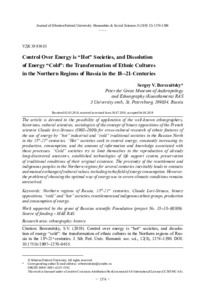Показать сокращенную информацию
Control Over Energy is “Hot” Societies, and Dissolution of Energy “Cold”: the Transformation of Ethnic Cultures in the Northern Regions of Russia in the 18th‑21st Centuries
| Автор | Bereznitsky, Sergey V. | en |
| Автор | Березницкий, С. В. | ru_RU |
| Дата внесения | 2019-08-30T02:27:44Z | |
| Дата, когда ресурс стал доступен | 2019-08-30T02:27:44Z | |
| Дата публикации | 2019-08 | |
| URI (для ссылок/цитирований) | https://elib.sfu-kras.ru/handle/2311/112617 | |
| Аннотация | The article is devoted to the possibility of application of the well-known ethnographers, historians, cultural scientists, sociologists of the concept of binary oppositions of the French scientist Claude levy-Strauss (1908–2009) for cross-cultural research of ethnic features of the use of energy by “hot” industrial and “cold” traditional societies in the Russian North in the 18th‑21th centuries. “Hot” societies seek to control energy, constantly increasing its production, consumption, and the amount of information and knowledge associated with these processes. “Cold” societies try to limit themselves to the reproduction of already long-discovered ancestors, established technologies of life support system, preservation of traditional conditions of their original existence. The proximity of the resettlement and indigenous peoples in the Northern regions for several centuries inevitably leads to contacts and mutual exchange of cultural values, including in the field of energy consumption. However, the problem of choosing the optimal way of energy use in severe climatic conditions remains unresolved | en |
| Аннотация | Статья посвящена рассмотрению возможности применения хорошо известной этнографам, историкам, культурологам, социологам концепции бинарных оппозиций французского ученого Клода Леви-Стросса (1908–2009) для кросс-культурного исследования этнических особенностей использования энергии «горячими» индустриальными и «холодными» традиционными обществами на российском Севере в XVIII–XXI веках. «Горячие» общества стремятся контролировать энергию, постоянно увеличивая ее производство, потребление, а также связанные с этими процессами объемы информации и знаний. «Холодные» общества стараются ограничиться воспроизводством уже давно открытых предками, устоявшихся технологий системы жизнеобеспечения, сохранения традиционных условий своего самобытного существования. Соседство переселенческих и коренных народов в северных регионах на протяжении нескольких веков неизбежно приводит к контактам и взаимообмену культурными ценностями, в том числе и в сфере потребления энергии. Однако до сих пор остается окончатель- но нерешенной проблема выбора оптимального пути использования энергии в суровых климатических условиях | ru_RU |
| Язык | en | en |
| Издатель | Сибирский федеральный университет. Siberian Federal University | en |
| Тема | Northern regions of Russia | en |
| Тема | 18th‑21st centuries | en |
| Тема | Claude Levi-Strauss | en |
| Тема | binary oppositions | en |
| Тема | “cold” and “hot” societies | en |
| Тема | resettlement and indigenous ethnic groups | en |
| Тема | production and consumption of energy | en |
| Тема | северные регионы России | ru_RU |
| Тема | XVIII–XXI вв. | ru_RU |
| Тема | Клод Леви-Стросс | ru_RU |
| Тема | бинарные оппозиции | ru_RU |
| Тема | «холодные» и «горячие» общества | ru_RU |
| Тема | переселенческие и коренные этносы | ru_RU |
| Тема | производство и потребление энергии | ru_RU |
| Название | Control Over Energy is “Hot” Societies, and Dissolution of Energy “Cold”: the Transformation of Ethnic Cultures in the Northern Regions of Russia in the 18th‑21st Centuries | en |
| Альтернативное название | Контроль над энергией «горячих» обществ и растворение в энергии «холодных»: трансформация этнических культур в северных регионах России в XVIII–XXI веках | ru_RU |
| Тип | Journal Article | en |
| Контакты автора | Bereznitsky, Sergey V.: Peter the Great Museum of Anthropology and Ethnography (Kunstkamera) RAS 3 University emb., St. Petersburg, 199034, Russia; ORCID: 0000–0001–6235–5542; svbereznitsky@yandex.ru | en |
| Контакты автора | Березницкий, С. В.: Музей антропологии и этнографии им. Петра Великого РАН (Кунсткамера) Россия, 199034, Санкт-Петербург, Университетская наб., 3 | ru_RU |
| Страницы | 1374-1390 | ru_RU |
| DOI | 10.17516/1997–1370–0455 | |
| Журнал | Журнал Сибирского федерального университета. Гуманитарные науки. Journal of Siberian Federal University. Humanities & Social Sciences;2019 12 (8) | en |

